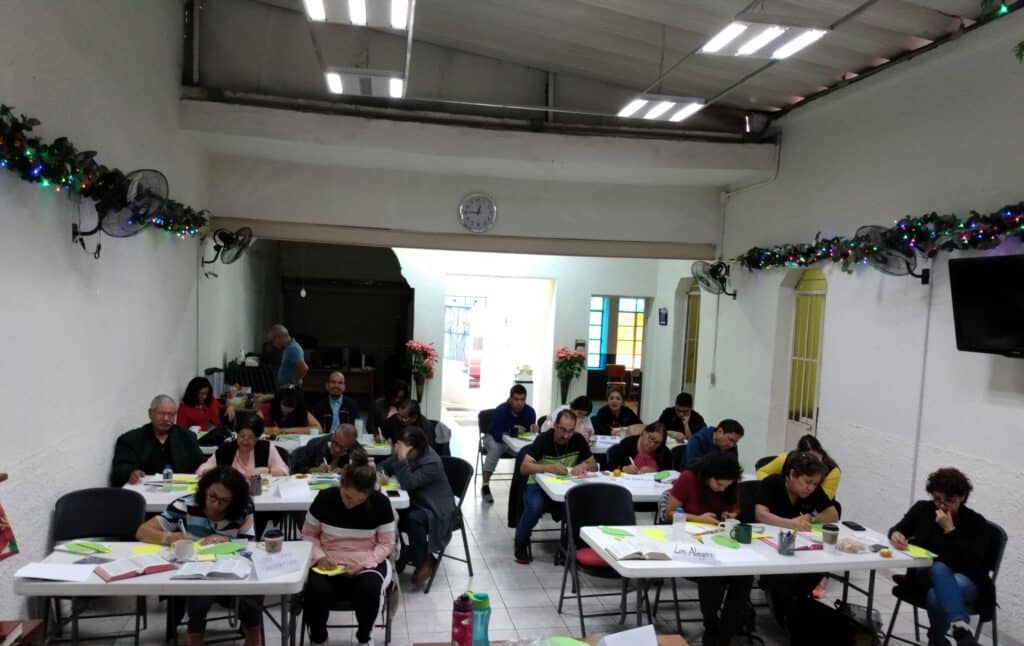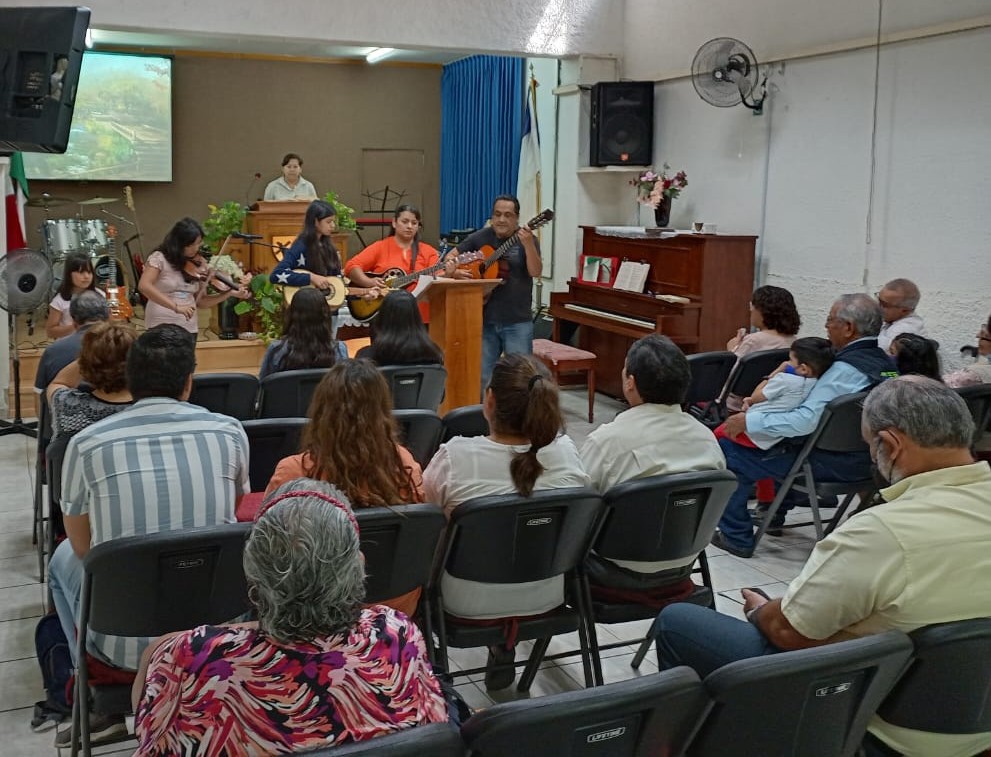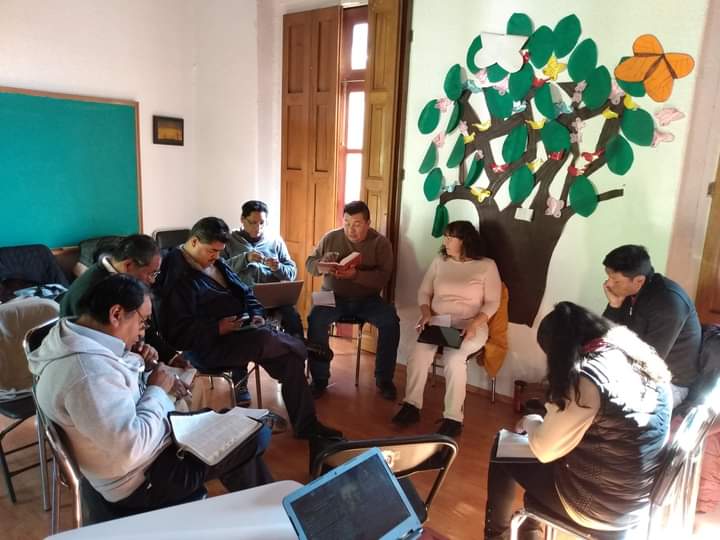How good and pleasant it is that families live in harmony: An experience of pastoral accompaniment.
Cindy Moraga-Selva served the Theological Community of Mexico (CTdeM).

During the last semester of 2022, our missionary work was to provide pastoral accompaniment to a local congregation of the Disciples of Christ church in Guadalajara, Jalisco. This community of faith is very committed to the care of individuals and families. One of their ministries is to be alongside people who live on the streets, echoing the call of the Lord: “Because I was hungry, and you gave me food…” (Mt. 25:35). This spirit of solidarity has led this community to live their relationships with love despite conflicts and crises. Like any congregation, the families that make it up live their faith from their daily experiences full of significant challenges: material support, children’s education, citizen insecurity, gender violence, socio-political crises, and the urgency of Christian testimony.
From our mission work in Mexico, we have considered it essential to strengthen the pastoral work aimed at promoting and guaranteeing life to the full for individuals and families. In contexts where different types of violence occur, especially intrafamily violence, it is necessary to address family issues from a biblical, pastoral, and social perspective. That is why part of our pastoral work focused on counseling and pastoral accompaniment to church families in situations of illness or loss of a loved one and proper management in conflict resolution.
Observing families’ diverse situations and needs led us to organize, in coordination with the Board of Church Officials, an experiential workshop called “Full and abundant life for all families.” The families participating in the seminar were interested in and committed to a comprehensive mission to care for each person: boys, girls, adolescents, young adults, and older adults. From the study of Psalm 23, three actions were identified for pastoral accompaniment that seeks the holistic well-being of individuals and families: sustain, guide, and protect.

The workshop was developed through a participatory and experiential methodology. The reality that families live in was the starting point for assessing the signs of brokenness and violence and the signs of a full life. Family life is presented as a journey through time, where it is essential to look at the past, review the present, and head toward the future. Recognizing that all families have lived painful and broken experiences is crucial. Still, there are also times of blessing and life at its fullness. It seeks to heal and restore life by facilitating spaces for forgiveness, reconciliation, well-being, and justice. We also celebrated the signs and signs of full and abundant life. Families were encouraged to continue to affirm, defend, and promote this gospel demand: that all have life and have it to the full (John 10:10).
The other emphasis of the experience was to provide families with tools for the constructive and positive resolution of conflicts, thus overcoming all types of violence and abuse. It must be recognized that violence is an issue that affects us all. This understanding is essential to finding solutions and improving intra-family relationships’ quality. In the workshop, we learned to see conflicts and crises as opportunities to grow and improve. We appropriated tools and skills to accompany those who suffer effectively and effectively. We exercised the language of love to express and communicate our positive feelings, affirming the dignity and value of people. In addition, we recognized the need to eliminate all types of violence, abuse, and mistreatment, especially towards children and women.
As a product of our experience, individuals, families, and the church can plan actions to improve and head toward the fullness of life. Their plans seek to heal wounds and restore relationships, empower families to pursue their integral well-being, and develop capacities for resilience. The three pillars of resilience were worked on to assess our resources to face adverse life situations: we are, we can, and we have.
I am deeply grateful to the Disciples of Christ church in Guadalajara for the opportunity to share and learn during this missionary and pastoral time. To Global Ministries for giving us the opportunity during these last five years to serve the most vulnerable and, in this way, bear witness to God’s love and grace.
Que bueno y agradable es que las familias vivan en armonía:
Una experiencia de acompañamiento pastoral.

Durante el último semestre del 2022 nuestro trabajo misionero consistió en acompañar pastoralmente a una congregación local de la iglesia Discípulos de Cristo en Guadalajara, Jalisco. Una comunidad de fe muy comprometida con el cuidado de las personas y las familias. Uno de sus ministerios es acompañar a personas que viven en situación de calle, haciendo eco del llamado de su Señor: “Porque tuve hambre, y me distes de comer…” (Mt. 25:35). Este espíritu solidario ha llevado a esta comunidad a vivir sus relaciones con amor a pesar de los conflictos y crisis. Como toda congregación, las familias que la conforman viven su fe desde sus experiencias cotidianas llenas de grandes desafíos: el sustento material, la educación de los hijos, la inseguridad ciudadana, la violencia de género, las crisis socio – políticas y la urgencia del testimonio cristiano.
Desde nuestro trabajo de misión en México, hemos considerado importante el fortalecimiento de la labor pastoral dirigida a promover y garantizar la vida en plenitud de las personas y las familias. En contextos donde se presentan diferentes tipos de violencia, especialmente violencia intrafamiliar, es necesario abordar los temas vinculados a las familias desde una perspectiva bíblica, pastoral y social. Es por ello, que parte de nuestra labor pastoral se enfocó en brindar consejería y acompañamiento pastoral a las familias de la iglesia en situaciones de enfermedad o perdida de un ser querido, y el manejo adecuado en la resolución de conflictos.
Observar las diversas situaciones y necesidades de las familias, nos llevó a organizar, en coordinación con la Junta de Oficiales de la iglesia, un taller vivencial denominado “Vida plena y abundante para todas las familias”. Las familias que participaron del taller se mostraron interesadas y comprometidas con una misión integral para el cuidado de cada persona: niños, niñas, adolescentes, jóvenes adultos y adultos mayores. A partir del estudio del salmo 23, se identificaron tres acciones para el acompañamiento pastoral que buscan el bienestar holístico de las personas y las familias: sustentar, orientar y proteger.

El taller se desarrolló a través de una metodología participativa y vivencial. La realidad que viven las familias fue el punto de partida para valorar no solo los signos de quebranto y violencia, sino también los signos de vida plena. La vida en familia es presentada como un viaje en el tiempo, donde es indispensable mirar el pasado, revisar el presente y encaminarnos hacia el futuro. Es importante reconocer que todas las familias han vivido y viven experiencias dolorosas y de quebranto, pero también existen tiempos de bendición y vida plena. Se busca sanar y restaurar la vida facilitando espacios para el perdón, la reconciliación, el bienestar y la justicia. También celebramos los signos y señales de vida plena y abundante, y se motivó a las familias a continuar afirmando, defendiendo y promoviendo esta demanda del evangelio: que todos tengan vida y la tengan en abundancia (Juan 10:10).
El otro énfasis de la experiencia fue proporcionar herramientas a las familias para la resolución constructiva y positiva de los conflictos, superando así todo tipo de violencia y maltrato. Hay que reconocer que la violencia es un asunto que nos afecta a todos y a todas. Esta comprensión es fundamental para buscar soluciones y mejorar la calidad de las relaciones intrafamiliares. En el taller aprendimos a ver los conflictos y las crisis como oportunidades para crecer y mejorar en la vida, nos apropiamos de herramientas y habilidades para acompañar a los que sufren de forma efectiva y afectiva; ejercitamos el lenguaje del amor para expresar y comunicar nuestros sentimientos positivos afirmando la dignidad y el valor de las personas, reconociendo la necesidad de eliminar todo tipo de violencia, abuso y maltrato especialmente hacia la niñez y las mujeres.
Como producto de nuestra experiencia, las personas, familias e iglesia serán capaces de planificar acciones para mejorar y encaminarse hacia la plenitud de vida. Sus planes buscan sanar las heridas y restaurar las relaciones, empoderar a las familias para procurar su bienestar integral y desarrollar capacidades para la resiliencia. Se trabajaron los tres pilares de la resiliencia para evaluar los recursos con que contamos para hacer frente a las situaciones adversas de la vida: somos, podemos y tenemos.
Agradezco profundamente a la iglesia Discípulos de Cristo de Guadalajara por la oportunidad de compartir y aprender durante este tiempo misionero y pastoral. A Ministerios Globales por darnos la oportunidad durante estos últimos cinco años de servir a los más vulnerables y de esta forma dar testimonio del amor y la gracia de Dios.
Cindy Moraga-Selva served the Theological Community of Mexico (CTdeM). Her appointment is made possible by your gifts to Disciples Mission Fund, Our Church’s Wider Mission, and your special gifts.

